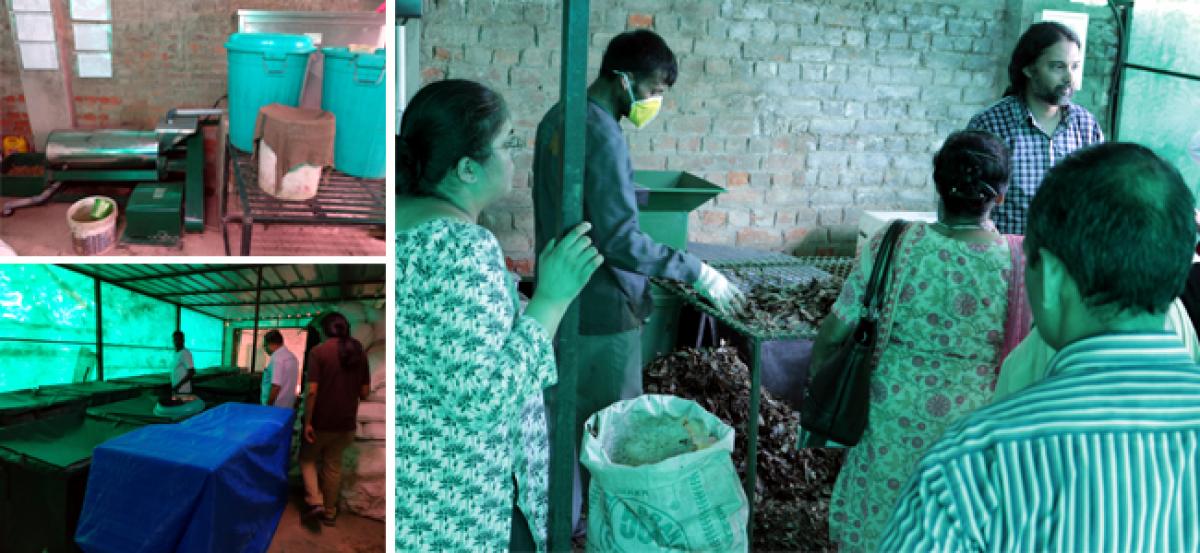Live
- NASA Issues Asteroid Alert: 720-Foot Rock Approaching Earth at High Speed
- Mahesh Kumar Goud Assumes Role as TPCC Chief
- Devotees Flood Khairatabad Ganapati on Final Day of Ganesh Chaturthi
- Union Minister Kishan Reddy Writes to CM Revanth Reddy, Declines to Attend 'Praja Palana Dinotsavam'
- Deputy CM Bhatti Vikramarka Receives Prestigious Invitation to Nobel Peace Summit in Mexico
- GANESH NIMAJJANAM 2024: Focus on Eco-Friendly Immersions as Hyderabad Prepares for the Grand Farewell
- Harish Rao Criticises Revanth Reddy’s Leadership, Highlights KCR's Governance
- Hyderabad Faces Heavy Traffic Jams in Several Areas
- Nani's Saripodhaa Sanivaaram Hits 100 Crore+ Worldwide
- Arvind Kejriwal should never have entered politics, says Anna Hazare
Just In
Is decentralization of waste an answer to Gurugram woes amidst sanitation workers’ strikes?


The ongoing strike by sanitation workers in Gurugram leading to piling up of garbage has once again underscored the need for decentralization of waste as an answer to the city’s health woes.
Gurugram: The ongoing strike by sanitation workers in Gurugram leading to piling up of garbage has once again underscored the need for decentralization of waste as an answer to the city’s health woes. Strikes by sanitation workers have become a norm. With the strike entering the 14th day today, talks between the government and workers over equal pay and demand for permanent jobs have failed to pacify the latter. Meanwhile, Municipal Corporation Gurugram has initiated a penalty drive for people caught littering the streets. However, the condition of the city continues to be deplorable.
Amidst the ongoing stir, DLF-1, H-Block has set a new example in solid waste management. The compost plant was commissioned at the area in 2015 catering to H and G Blocks. The society has encountered a significant milestone as approximately 50,000 Kg of organic waste (food+garden) has been segregated and processed into nutrient-rich compost instead of being dumped or burnt. Approximately, 10,000 kg of compost has been produced from this facility out of which 7,000 kg of compost has been utilized for greening and landscaping of the individual houses, parks and common areas, 3,000 kg of compost sold to farmers, farmhouses and other establishments, even to the horticulture department of Mughal Garden at Rashtrapati Bhawan.
An initiative of DLF Foundation under Swachh Bharat Abhiyan, the compost plant was inaugurated by Mr. T.L Satyaprakash, former Deputy Commissioner, Gurugram. It is a community- level initiative for waste management by promoting source segregation and composting of horticulture and household food wastes. Prior to this, all the waste from G&H Blocks was getting dumped at Bhandwari Waste Management Plant situated on the Aravalis.
Managed jointly by RWAs (HBRC, GBRC, PCDG) with the support of DLF Foundation and DLF City RWA this facility treats the organic wastes that emanate from residential localities. The plant leverages state-of-the-art technology for waste processing that doesn’t cause any bad odor or unsanitary conditions.
This plant processes 600 kg of horticulture and food waste daily. Compost produced from garden and food waste is rich in soil nutrients and good for organic farming. The compost is collected and distributed to the local farmers.
“It is heartening to note that H-Block DLF-1 has set an example in solid waste management by utilizing best practices. The plant has achieved a significant milestone by segregating about 50,000 Kg of organic wastes. The model has the potential to be replicated in other parts of Gurugram as well,” said Col Prakash Tewari, Executive Director, DLF Foundation.
“By demonstrating best practices in solid waste management, DLF Phase 1 RWA and DEDL have together supported this initiative that has indeed heralded a social change and has set an example for rest of the condominiums at Gurugram,” said Mr Sudhir Kapoor, President RWA.
“The establishment of the compost plant and implementation of the best practice in solid waste management has not only resulted in cleanliness but also brought about a behavioral change among the DLF-1 residents. Now the residents are have become aware of the need of the waste segregation at source,” said Vinod Kumar, a resident of H block DLF phase 1.

© 2024 Hyderabad Media House Limited/The Hans India. All rights reserved. Powered by hocalwire.com






